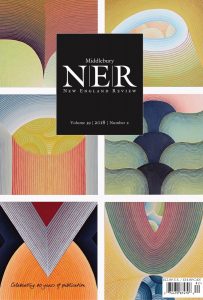
NER poet Dilruba Ahmed (“Underground,” NER 39.2) talks with Editorial Panel member Angela Narciso Torres about public acts of resistance and private acts of opposition, the music and mystery of her own mother’s poetry, and the wonder of a new collaboration with an old friend.
Angela Narciso Torres: Like many of the poems in your poetry collection, Dhaka Dust, “Underground” addresses contemporary social issues while also being deeply rooted in history. Can you talk more specifically about the origins and the historical/societal context that gave rise to this poem?
Dilruba Ahmed: The word “resistance” has been on my mind recently: what does it mean to engage in very public acts of resistance, such as protests and marches, as well as more subtle or even private acts of opposition? Part of the lesser-known history of the South Asian immigrant community here in the US, for example, includes families organizing fundraisers together to support Bangladesh’s war for independence. Women prepared pounds and pounds of “chana chur” (a spicy and savory snack) in Philadelphia and the tri-state area to sell at a large gathering in Washington, DC, and then sent the proceeds back home. I’m interested in the ways that—particularly during difficult times—a seemingly small act can contribute to a greater purpose. And how those acts, even when they occur in relative isolation, can bind people together toward a common goal.
On a more public level, I only recently learned of my aunts’ participation in anti-government rallies in the ’50s, during a time of Pakistani rule in present-day Bangladesh. Crowds of women involved in the Bengali language movement shouted in the streets, wearing black saris—with even my mother (just a child at that time) swept along in the tide of vocal resistors.
In this particular poem, I was thinking of the various forms of private and public resistance by women under Taliban rule in Afghanistan, and the risks involved. I was interested in conveying the notion of resistance as not only fighting back, but also finding ways to thrive under very difficult circumstances.
When I consider the incredible resurgence of civic engagement of the last two years here in the US, I find it very humbling to dwell on the lives of women in situations like this. Doing so certainly lends some perspective to the present challenge of organizing and/or participating in protests and other calls to action, engaging lawmakers, placing phone calls, etc. in the midst of the demands of work and family, but still within an existence (for many of us) of relative privilege, comfort, and/or freedom.
ANT: This poem uses anaphora (“they are turning,” “they look on,” “they paint,” “they are stripping veils,” etc.), achieving a cumulative, incantatory power. Can you discuss how you decided to employ this device for furthering your intentions for this poem?
DA: An early draft of the poem emerged in past tense from the point of view of one woman. But midway through that initial draft, the poem slipped into a third person POV, and shifted to the present tense. Since—for the women in this poem—navigating everyday existence is a continual act of resistance and survival, moving toward a more active and immediate verb tense seemed truer to the material. The repetition came about as the scene unfolded, as I tried to depict action after action that embodied the courage, strength, and perseverance of women under continual threat. I hoped to convey their sense of agency within that realm.
ANT: I’ve often noticed themes of motherhood and family weaving through your poems. They’re especially significant in this poem in which mothers serve as both nurturing/protective and empowering figures for their daughters in a society that fails to provide the freedoms and opportunities they rightfully deserve. How has your own experience of daughterhood and/or motherhood influenced your writing?
DA: My mother was one of my key writing inspirations—as a young woman in Bengal, she had participated in Bengali poetry recitation competitions and also composed her own poems. During my childhood in Ohio, she continued to recite, record, and compose Bengali poetry. Because I could neither understand the formal Bengali of her recitations, nor read the Bengali script I found on her drafts around the house, some of my early experiences of language were imbued with both music and mystery. I think that notion of language as music deeply affected me. Even now, many of my draft poems are initially driven more by sound than by content. In some ways, I think that her interest in poetry gave me permission to be in tune with something I couldn’t really articulate at the time.
ANT: Meena Alexander writes, “We have poetry/ So we do not die of history.” What I admire about your work is that while it may sometimes be rooted in autobiography, it always remains keenly aware of both the contemporary moment and the undercurrents of history. What do you see as the poet’s responsibility in our current political climate?
DA: I love those lines! Going back to the idea of resistance in acts large and small, public and private, I tend to think that the poet’s responsibility remains unchanged in some ways—that is, to create: to transmute emotional truths into art, and to follow one’s creative impulses. In our earliest stages of writing, this freedom to follow our poetic impulses is sacred.
That said, I think that we truly honor our responsibility as writers when we continually strive to hone our craft strategies so we can better serve our poems—and that part of that growth is acknowledging the social, political, cultural, and historical contexts that can and should inform our work. I guess both of these aspects come into sharper focus during the revision phase, when we try to scrutinize what our work is attempting to do, how and whether it gets there, and what’s missing.
Personally, I often find myself drawn to topics that are overtly political. However, I would never deny that a poem about the sky at dawn, or the love of one’s dog, or a thought experiment that imagines a cross between a crocodile and a kitten—I think that in our current context these poems too, can be a kind of resistance. Given the present conditions in our country—a time of violence, greed, corruption, racism, homophobia, sexism, and so on—I think even a seemingly apolitical poem can assume elevated status as an act of survival. That is, couldn’t we argue that an evocation of humor, beauty, love, generosity, compassion, or even frivolity is also a form of resistance against all of the ugliness before us? Such poems hold the potential to move us to protect what we cherish the most about our lives and about the world, just as more overtly political poems might inspire us through different means to take similar action. I’m thinking, too, of a quote from Auden’s Age of Anxiety: “In times of war even the crudest kind of positive affection between persons seems extraordinarily beautiful, a noble symbol of the peace and forgiveness of which the whole world stands so desperately in need.” In a way, any gesture to create might be regarded as a crude affection, or even a form of love—one that just might help to restore our sense of humanity in some small or unexpected way.
ANT: What creative projects are you currently working on, poetry-related or otherwise?
DA: I’m in the midst of a new collaboration with an old friend: we send each other rough material for a poem, and the other person takes a crack at the first draft. We then try to revise and polish the piece together. Working with someone else’s raw material has proven to be a fun and liberating experience—I’m much more likely to consider a wider set of possibilities because my relationship with the material seems more distanced and playful. At the same time, seeing what someone else creates with some of my raw material has been an eye-opening experience that has helped me expand my approaches to revision. Working on this collaboration has definitely restored a sense of fun and spontaneity to my writing process.
Thanks for all your great questions, Angela!
Dilruba Ahmed’s book, Dhaka Dust (Graywolf Press, 2011), won the Bakeless Prize. Her poems have appeared in Alaska Quarterly Review, Kenyon Review, PEN America, Poetry, Smartish Pace, and elsewhere. Ahmed is the recipient of the Florida Review’s Editors’ Award, a Dorothy Sargent Rosenberg Memorial Prize, and the Katharine Bakeless Nason Fellowship in Poetry awarded by the Bread Loaf Writers’ Conference. She holds degrees from the University of Pittsburgh and Warren Wilson College’s MFA Program for Writers. www.dilrubaahmed.com.
